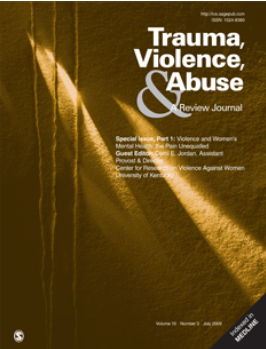叙利亚难民心理治疗研究中使用的心理治疗干预:系统回顾
IF 5.4
1区 社会学
Q1 CRIMINOLOGY & PENOLOGY
引用次数: 0
摘要
中东持续不断的冲突导致叙利亚难民大量涌入,使他们遭受严重的创伤经历,并造成一系列心理健康问题。本系统综述检查了叙利亚难民心理治疗研究中采用的心理治疗干预措施,重点关注了Scopus、PubMed、Web of Science和ScienceDirect上的22篇文章。该审查强调了对叙利亚难民进行心理治疗干预的必要性,因为各种形式的暴力和剥削的风险增加导致创伤后应激、抑郁、焦虑、悲伤和丧失的高患病率。在回顾的研究中,心理治疗干预措施包括问题管理+ (PM+)、认知行为治疗(CBT)、眼动、脱敏和再加工治疗(EMDR)、叙事治疗、舞蹈和运动治疗、艺术治疗、社会心理干预和在线心理治疗。在对青少年和儿童难民进行的研究中,应用了各种心理治疗干预措施,如认知行为技能治疗、EMDR团体治疗、艺术、舞蹈和运动治疗以及青少年早期情绪技能。在对成年难民进行的研究中,值得注意的是,研究经常采用PM+干预。可以看出,PM+在难民进程开始时特别适用于难民营环境。在大多数研究中,首选小组形式和面对面的心理治疗干预。研究结果强调了考虑到叙利亚难民的文化背景和经历的量身定制的干预措施的重要性。通过解决这些障碍并采取对文化敏感的办法,精神卫生专业人员可以更好地支持叙利亚难民在东道国的心理康复和融入社会。本文章由计算机程序翻译,如有差异,请以英文原文为准。
Psychotherapeutic Interventions Used in Psychological Treatment Studies With Syrian Refugees: A Systematic Review
The ongoing conflicts in the Middle East have led to a substantial influx of Syrian refugees, exposing them to severe traumatic experiences and contributing to a range of mental health issues. This systematic review examines psychotherapeutic interventions employed in psychological treatment studies with Syrian refugees, focusing on 22 articles identified across Scopus, PubMed, Web of Science, and ScienceDirect. The review highlights the need for psychotherapeutic intervention for Syrian refugees due to the high prevalence of post-traumatic stress, depression, anxiety, grief, and loss which results from an increased risk of various forms of violence and exploitation. Psychotherapeutic interventions in the reviewed studies were Problem Management Plus (PM+), Cognitive Behavioral Therapy (CBT), eye movement, desensitization and reprocessing therapy (EMDR), narrative therapy, dance and movement therapy, art therapy, psychosocial interventions, and online psychotherapy. In the studies conducted with young and child refugees, various psychotherapeutic interventions such as cognitive-behavioral skills therapy, EMDR group therapy, art, dance and movement therapy, and early adolescence skills for emotions were applied. In studies conducted with adult refugees, it is noteworthy that studies frequently applied the PM+ intervention. It is seen that PM+ was applied especially in the camp environment at the beginning of the refugee process. In most of the studies, group format and face-to-face psychotherapeutic intervention were preferred. The findings emphasize the importance of tailored interventions that account for the cultural backgrounds and experiences of Syrian refugees. By addressing these barriers and implementing culturally sensitive approaches, mental health professionals can better support the psychological recovery and integration of Syrian refugees in host countries.
求助全文
通过发布文献求助,成功后即可免费获取论文全文。
去求助
来源期刊

Trauma Violence & Abuse
Multiple-
CiteScore
13.60
自引率
7.80%
发文量
131
期刊介绍:
Trauma, Violence, & Abuse is devoted to organizing, synthesizing, and expanding knowledge on all force of trauma, abuse, and violence. This peer-reviewed journal is practitioner oriented and will publish only reviews of research, conceptual or theoretical articles, and law review articles. Trauma, Violence, & Abuse is dedicated to professionals and advanced students in clinical training who work with any form of trauma, abuse, and violence. It is intended to compile knowledge that clearly affects practice, policy, and research.
 求助内容:
求助内容: 应助结果提醒方式:
应助结果提醒方式:


